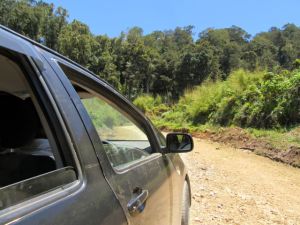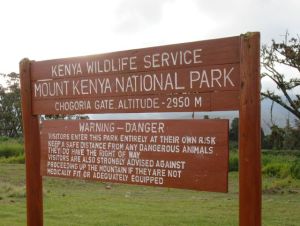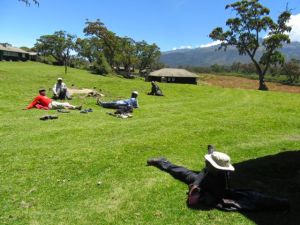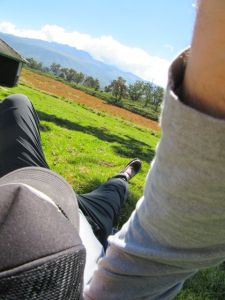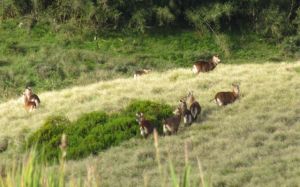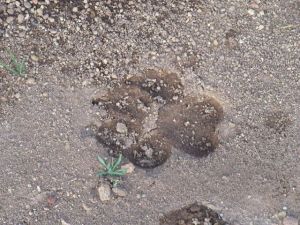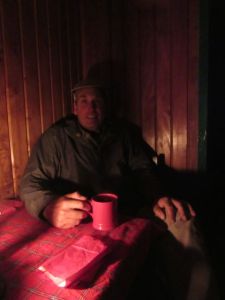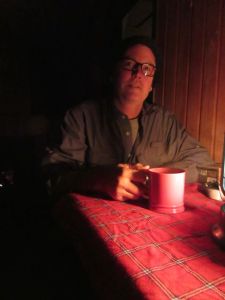It was late morning, Saturday August 22nd, and the skies were clear. We were in a vehicle headed up a dirt road to the Chogoria gate of Mt. Kenya National Park. Despite three days of rest in Nanyuki, Kenya at 1975 meters (6479 feet) in elevation, I was feeling a bit lightheaded. It was all a bit of a blur after all. There were months of preparing for the move to Africa, an Atlanta-Amsterdam-Nairobi flight, and the time difference, and jet lag to consider. Now we were approaching Chogoria Camp at 2950 meters (9678 feet).
Driving up to Chogoria Camp with Solomon, John, and David.
A park vehicle descended the mountain road, slowed, then stopped. We too stopped with lowered windows. The air was cool and clean. A park ranger in military fatigues hopped out and came around the back of his truck, where I could see freshly cut wood. He was smiling, speaking in Swahili, and describing something up the road. Solomon, our driver, and John Karumba, our mountain guide asked a few questions. More words were exchanged as I tried to gauge the tone of the conversation. The ranger waved us on.
“John, what did the ranger say?,” I asked. “Oh,” John replied, “He just wanted us to know that an elephant had knocked down some trees up the road. They cleared a path for us. He didn’t want us to worry. Past the trees the elephant killed a man and he is laying on the side of the road. They are going to get the police now.” English spoken by native Kenyans is sometimes hard to understand for an American. Perhaps it is the mix of British accent with the staccato rhythm of Swahili. David, my trekking mate from Philadelphia who does real estate development and renovation said, “An elephant killed a man up the road?” “Yes, John replied, “He is dead on the side of the road, just past the trees.”
We were silent now as we continued through the forest on the smooth dirt road. Dense trees and underbrush lined each side. Just as the ranger had described, one or two kilometers up the road there were trees down. It wasn’t just a few. This elephant had knocked down large trees, eight or ten. David was an experienced traveler in Kenya and other parts of Africa. He said that elephants need to eat a lot to survive. The easiest way to get food is to knock down a tree along the road. It falls into the empty road and they eat the leaves.
The road sloped sharply to the side in the opening the rangers had made. They had only cleared enough room for a vehicle to pass. I could hear the branches scraping along the side of our car. We ran over a branch with leaves and the tires slipped, we halted for a moment, and then Solomon pushed the accelerator. I thought we might be stuck. He pushed the gas again and the Toyota station wagon gently moved forward. We were through. Now, of course, we were all looking for the man on the side of the road.
Not far ahead there were more small trees down on the left side of the road. In the middle of the trees and branches lay a man, face down on the ground. He appeared to be a local, slight of build, with short black hair. He was wearing what appeared to be some kind of a gray wrap. I wondered to myself if he was wearing the wrap or what the rangers had draped over him. His left thigh was split wide open. I could see deep red muscle and white broken bone. Blood pooled on the ground, staining the red earth even redder. While the leg injury was serious, I could only imagine what had actually killed the man. It could have been a tusk to the belly or chest. It could have been one or both of the elephants front feet crushing the man into the ground.
Our guide John pulled out his mobile phone and snapped a photograph. David was sitting on the side of the vehicle closest to the man. He voice became tense, “Okay, there’s nothing we can do, let’s get moving.” Solomon put the car into drive and continued. “What was the man doing out here all alone?” I asked. “He could have been a poacher or a honey collector,” Solomon replied. “Or maybe he was mad. The people of Meru have witch doctors. Say you have stolen something, they can put a curse on you and you will walk around mad talking to yourself. We see this a lot.” The clear day seemed to darken as I thought about the lone walker up this road, what he might have been doing, and what he encountered. “He probably startled the elephant,” John said, “It is important to make noise as you walk through the forest, as to not startle the elephants.”
We continued another 8 or 10 kilometers to Chogoria Gate. I read the sign, “Warning-Danger. Visitors enter this park entirely at their own risk. Keep a safe distance from any dangerous animals. They do have the right of way. Visitors are also strongly advised against proceeding up the mountain if they are not medically fit or adequately equipped.”
The Sign at Chogoria Camp
An open green glade lay before me. I exited the vehicle and grabbed my pack. My feet sunk into grass three or four inches thick. Large trees punctuated the open area, with rustic cabins at the perimeter. Several men lounged on the thick grass including the cook, porters, and James (in the white hat) who was an apprentice guide to John. One man said, “Come, enter the cabin. We have prepared a tea for you.” They showed David and me to a small room with three single beds. “Choose a bed, each of you, and put your packs down on the other. Then come to tea.”
Hanging out at Chogoria Camp
I had tea, a rich Kenyan blend with ground ginger. Then I poured more hot water and made myself a mocha out of instant coffee and what was labeled Drinking Chocolate. “Time to rest,” a man said. I joined the group outside in the warm sun. I looked across a vast meadow to the mountain. I tried to sleep but sleep was impossible. As I lay there with eyes closed I thought to myself, “I am in Africa. This is Africa.”
Resting on the Grass, Looking at Mt. Kenya
I walked over to James, who sat resting but was clearly awake. James and the rest of the group had arrived earlier, and had missed seeing the dead man on the side of the road. They had heard about it though. “Are elephants the most dangerous animals here?” I asked. “No, he replied, “Buffalo are more dangerous than elephants.” I looked at the grass around me at what appeared to be scattered piles of cow dung. “Are there cows around here?” I asked. “No, that is buffalo dung,” he said. “They come through here at night. If you leave the cabin for any reason at night, be sure to look around with your torch before stepping foot out the door.” “Thank you for telling me,” I replied.
I thought back a conversation that I had with John on a hike we did two days earlier. “John,” I said, “I have a question. I am from Arizona which is a wild place and has some dangers, like the rattlesnake for example. What are the dangers here I should know about? I am not afraid. I just want to know and be prepared.” “There are no dangers here,” John replied. “No dangers,” I repeated dryly. “There are no dangers here, you will be safe,” he said. I wondered to myself if this was a cultural difference. I had already seen a dead young woman on my first day in Kenya, probably struck by a vehicle as she walked on the side of the road. I knew there were dangers. There is risk in everything, I thought. The question is the level of risk, and how prepared I would be to deal with the risk.
I went back to my grassy spot in the shade of a large tree. As I closed my eyes, I heard voices approaching from across the grass. “That’s Spanish,” I thought to myself, “Spanish from Spain.” In my early twenties I had lived in Madrid for a year studying the Spanish language, literature, and history. One man and three women walked toward the cabin next to ours and put their packs down. They looked tired. “Are there showers, we heard there were warm showers?” the man asked a guide. “Yes, inside,” the guide replied. He was a strong, tall black man with an air of confidence. They sat on the grass while one women entered the cabin to take a shower. Another woman smoked a cigarette.
As the sun descended in the west toward Mt. Kenya, James offered to take David and I on a short walk. “There is a place we might see some wildlife,” he said. We exited Chogoria Gate and descended the road, the road that led toward the elephant. I found myself looking into the bushes, looking for an elephant, even though we were miles away from the elephant that had killed the man. “What will happen to the elephant?” David asked James. “The other elephants will smell the blood of the man on the elephant. He will be rejected from the herd. He might die on his own. If the rangers find him they will shoot him, because once he has killed a man, he might kill again,” James said. David looked up and to the left into a meadow, “Look, a herd of Water Buck.” The Water Buck were skittish. They immediately noticed us from a distance of about 100 meters. Some raised their heads while others cautiously moved slowly away.
Water Buck
We continued down the road. James looked down at an animal print in the dirt. “What is that? David asked. I quickly replied, “That looks like a baboon print.” On our walk days earlier James had pointed out a baboon print and that was the only thing that came to mind. I wondered to myself why I had answered when I obviously did not know anything. But maybe just maybe, I thought to myself, I could be right. I looked to James for the answer. “A baboon has the hands of a man, just smaller. This is not a baboon print. This is the print of a leopard, and it is fresh, within the hour,” James stated confidently. Look at the crisp outline of the pads and the clear claws. “Within the last hour,” he stated again. I looked over at the bushes.
Leopard Print
We returned to camp and our neighbors were outside sitting in the grass talking. “Hello. Where are you from?” I asked. We are from Barcelona. This is Emilio and I am Alicia. Ilia is from Bilboa and Carmen from Asturias. “I lived in Spain many years ago and loved it,” I said. I switched to Spanish, as I was missing speaking Spanish, although I had only been less than a week since leaving Tucson. We spoke in Spanish for awhile, then switched back to English. I asked about the trek up the mountain. Alicia said, “It was hard, but beautiful. I vomited going up and my legs were, how to you say, tight and painful.” “Cramping?” I asked. “Yes, I think so. And look at my hands,” she said. She held out her hands, palms down. The skin was red, swollen, and blistered. “Be careful with the sun,” she warned. And then she looked at me beaming, “But it was so beautiful it was worth all of it.” Alicia lifted her boots, “I will need new boots.” She was wearing what looked like good quality hiking boots, but there were chunks missing from the soles.”
The Spaniards had done the trek from West to East with a guide named Charles and several porters, entering at the Naro Moru gate near Nanyuki and hiking east. I had read about this way of doing it. The main issue is that it climbs very quickly, making adaptation to the altitude quite challenging. The Chogoria to Naro Moru, East to West route, allowed for a more gradual climb and more time hanging out on the beautiful eastern flank of the mountain. I asked Alicia what they had planned for the morning. She replied, “We will hike from Chogoria Camp two hours down the road where we will be picked up by a vehicle.” “Did you hear about the elephant attack?” I asked. “No, what happened? she replied. I told her about what we saw. “You might want to talk with your guide about your plan. Granted, I have only been in Africa four days. Is it a good idea to do morning walk, when elephants are most active, near where a elephant, upset and alone, just killed a man? Just talk with Charles first,” I recommended.
I heard someone say that dinner was served. I said good night to the Spaniards, and we briefly mentioned meeting later to talk more. We were served a traditional Kenyan meal in our cabin, next to a warm fire. David and I sat chatting about the day. I made myself another instant mocha. As I sat there in the warmth of the fire, I knew I was not going to make it out again.
David With a Cup of Tea
It was time to get some rest and prepare for the hike to Lake Ellis.
Enjoying a Mocha Before Bed
